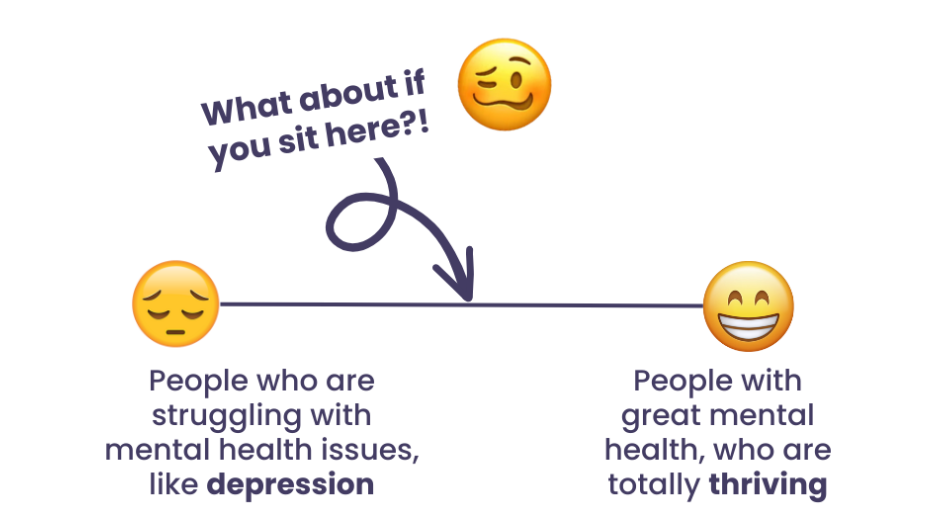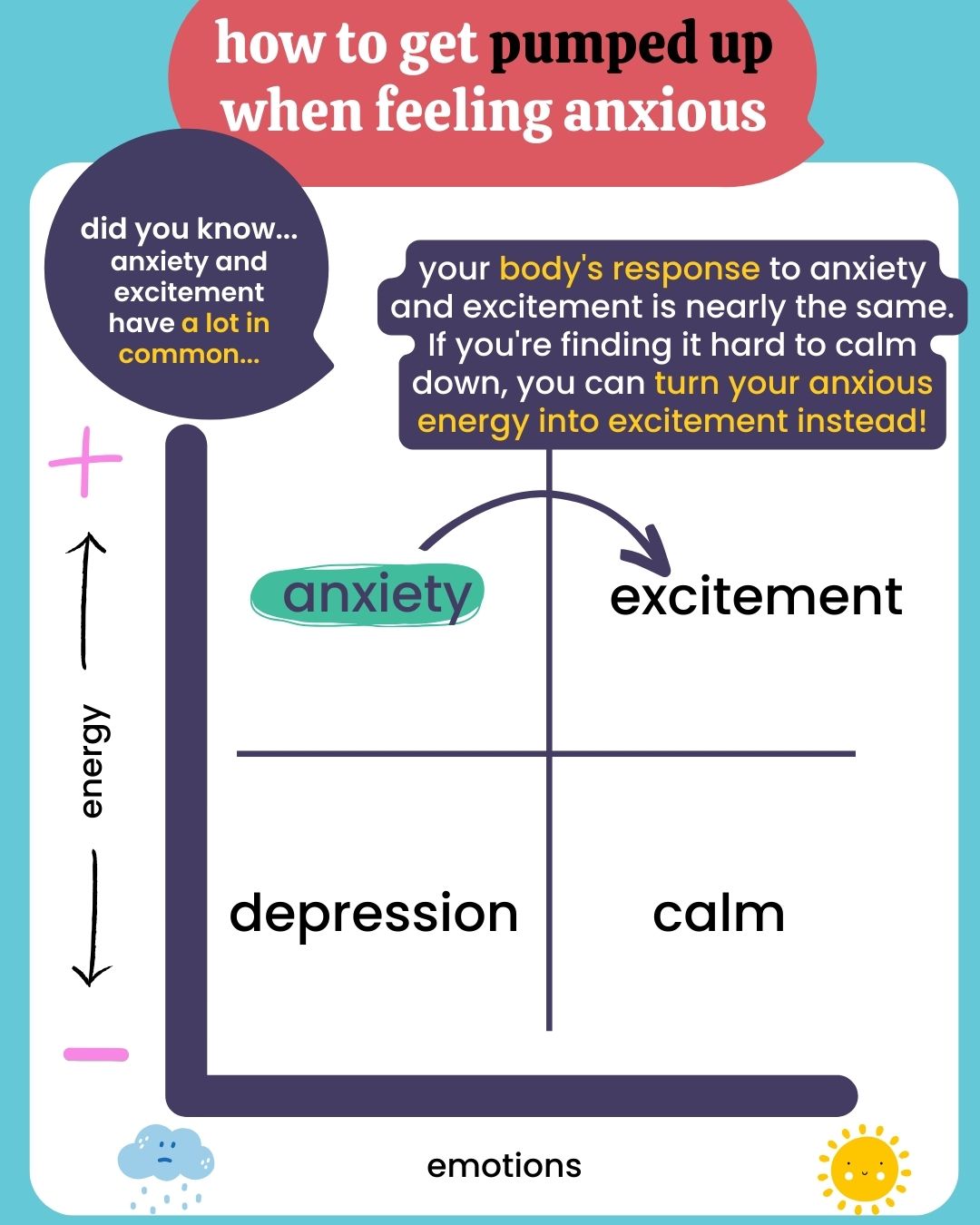Stress, burnout and languishing
Having good mental health isn't just an absence of mental illness - ...
READ MESo, you know you are dealing with stress, burnout or languishing – but what to do about it? We’ve got you covered with these counsellor approved strategies!

Mental health exists on a spectrum, with people thriving on one end and people who are struggling with mental health issues at the other.
If you’re reading this article it’s likely you’ve identified you’re sitting somewhere in the middle. You’re not thriving, but you’re definitely not doing as well as you would like.
Knowing if you’re feeling stress, burnout or languishing is step one to knowing how to cope.
Hot tip: if you’re unsure, first check out our article on what is the difference between stress, burnout and languishing.
Because stress is a physical response to something external, the best ways to cope with it are all to do with your physical body.
This is where you make sure you’re eating healthy, getting enough sleep, and exercising.
All these things help your body to function at its best, which allows it to better process stress. You’ve probably already got first-hand experience of not being your best self when you’re tired and hangry (hungry-angry).
Here are some strategies that can help you de-stress fast!
Breathing
Stress breathing is fast, shallow and can really mess up the balance of gases in your body.
Cool fact: a lot of toxins in our body get out of our system through our exhalation. (E.g. When you ‘burn fat’, it doesn’t go down the toilet – you actually breathe it out).
Stress breathing can make it harder for toxins and gases to get out of our system, which can make you feel more stressed. It’s a vicious cycle.
Breathe out and then do some slow, controlled breaths into your belly button to help bring things back into balance and feel calmer.
Grounding & ‘embodiment’
Grounding is all about connecting you to your body, and ‘embodiment’ is a fancy way of saying, ‘be in your body’.
The whole point is to stop focusing on your inner world (e.g. racing thoughts) and be in the present moment by focusing on things around you.
You could try stomping your feet, or spinning in a circle, or putting your hands in water, or even just picking up and touching things near you. All these things reconnect your brain with your body in the right now.
Reframing
Our counsellors love a good ol’ reframe. ‘Reframing’ simply means thinking about things differently. Like, if you’re worried about everything going wrong, you might also imagine everything going right too.
The cool thing about stress is that it isn’t always bad or negative – stress can actually be a positive thing, and it’s also part of our ‘getting excited and totally pumped’ response.
Professional athletes and performers learn techniques to help them turn stressed energy into excited energy.
You can try this by mentally telling yourself (reframe),
“This is exciting”
instead of
“I’m so stressed”
We know, we know – it's much easier said than done, but with practice it can actually work!

It’s important to cope with stress, as too much stress, for too long can sometimes lead or contribute to burnout, or mental health issues like anxiety or depression!
Unfortunately, burnout is much harder to deal with than stress (wah!) This is because the stuff that makes you feel burnt out – stuff like a full-on workload, is often outside of your control at school or work.

Burnout isn’t generally the fault of students or employees, but part of a bigger problem in schools and workplaces. This really sucks, as it can make dealing with it at a personal level much trickier - but, there are definitely things you can do to manage your mental health.
Dealing with burnout normally means getting to the bottom of whatever’s causing it.
The first step is to see if your school/workplace can help you get more control over all the stuff you have going on. Chat to them and see if they can help!
Possible solutions might look like:
Disclaimer: While burnout can affect anyone, the people more likely to experience burnout more often are people who have a disability, a learning disorder, or are neurodivergent. If this is you, check out our article on managing exam stress for some tips and tricks.
There are two types of motivations - and understanding what works for you can be helpful in preventing or managing burnout.
Everyone experiences and is motived by both types of rewards – but some people lean more one way than the other, and different situations give you different rewards.
The good news is: you can ‘hack’ these motivations to work for you. To be completely honest, it’s not a miracle solution to burnout – but it’s a way to make school or work a bit more bearable when you’re running on empty.


Problem #1: I’ve got bad grades and I don’t feel good enough
Your self-esteem is low – you’ve struggled with bad grades, underperformance and failure, and it’s making you feel constantly worthless and not good enough.
Just as an example, let’s say you’re doing badly in history and you’re burnt out by it. It might not be easy to get an extrinsic reward from it (e.g. coming first in the class or getting an A on an assignment).
So, you might try to find ways to make it more intrinsically rewarding. Like, maybe one day you hope to travel to Europe – and it sure would be helpful to know a bit about World War II when you’re there.
Problem #2: It’s so pointless/meaningless - I just don't care about it at all
If you feel like everything is meaningless, this might help.
You might be studying a topic that doesn’t interest you at all. You just don’t enjoy it. It’s not high on the intrinsic motivation for you.
No worries – maybe you can make it extrinsically motivating. You could challenge yourself to beat your last grades or organise a little competition between you and your friends to see who can do the best assignment. Or you could even give yourself a little ‘reward’ (doing something you enjoy) for getting your studying done.
Languishing increases your risk of getting depressed if it’s not dealt with. But there’s some good news – there are lots of things you can do to break out of the languishing rut!
Here’s our top three strategies:
Being able to get support early on can help stop things from getting worse.
With mental health existing on a spectrum, things like stress, burnout and languishing can lead to mental health issues later on if ignored.
If you’re experiencing stress, burnout or languishing, and you can’t seem to get through it on your own, we're here for you. call, start a webchat, or join our peer support social platform My Circle.
Stress, burnout and languishing
Having good mental health isn't just an absence of mental illness - ...
READ MESelf-care
Looking after yourself is an important coping strategy. Let’s look at ...
READ MECoping strategies
If you are feeling stressed, anxious or just struggling to deal, there ...
READ MEHow to manage anxiety
Anxiety can feel overwhelming, but there are some simple steps you can ...
READ METalking helps! We’re here for you.
No problem is too big or too small.
We're here 24 hours a day, 7 days a week